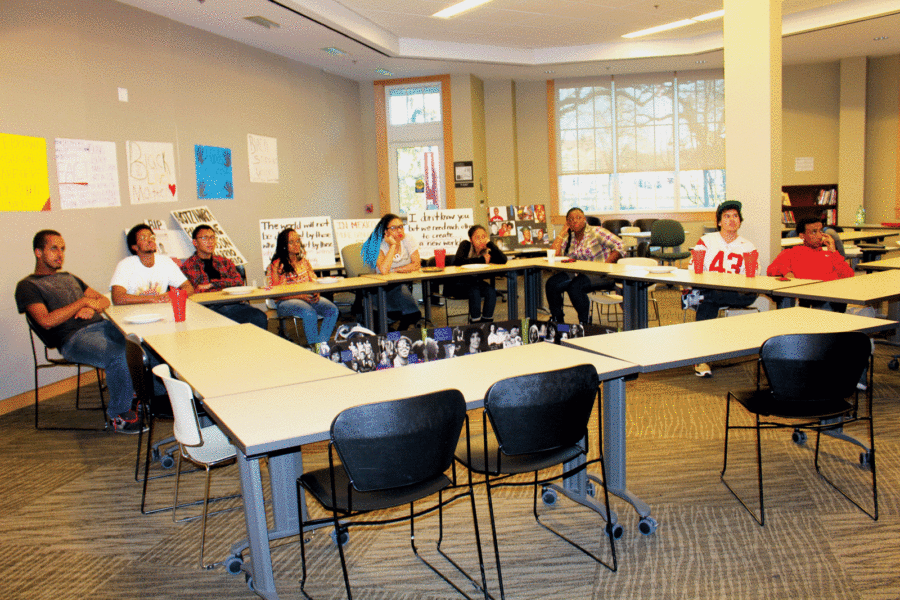Black Student Union members from the Santa Rosa Junior College continue to pursue justice for a racial incident that occurred in November in Rohnert Park.
An incident that would have been expected over 50 years ago in segregated southern states became a reality for SRJC and Sonoma State University BSU members on Nov. 10, 2014 when a group of white, college-aged individuals approached them outside the Double Decker Lanes bowling alley slinging racist remarks and telling them to “go back to Africa.”
As the club members were walking to their cars, one woman out of the hostile group pushed one of the female members of the BSU while calling her the n-word. BSU President Elias Hinit said the aggressive woman was ready to fight the BSU member, but her friends held her back. Instead of protection, BSU members were only met with further hostility and indifference from Rohnert Park Police officers, who arrived on the scene after the hostile group sped off.
Under California Penal Code 422.6, it is a misdemeanor to interfere with or oppress a person’s free exercise of their constitutional rights, by force or threat of force, based on their race, ethnicity or any other characteristic.
“The investigating agency would have to conduct an investigation to determine if the elements of a hate crime have been committed,” said Santa Rosa Council Member Ernesto Olivares. “Hate-motivated behavior or racial slurs may not be enough to charge someone with a hate crime.”
According to Hinit and the description of the incident, the hostile group’s racist taunts and actions implied a threat of violence, which could make the incident a hate crime. “Of course my peers felt threatened for their lives and well-being,” Hinit said.
California Civil Code section 52.1 states, “The Bane Act provides protection from interference by threats, intimidation or coercion or for attempts to interfere with someone’s state or federal statutory or constitutional rights,” provided there is a “hate motivation.”
Hinit said the police officers would not listen to the group’s story, even after they stated they were victims of a hate crime. Instead the officers countered them with hostility and repeatedly ordered them to “get off the street” and to “go home,” while wielding batons.
As one high school student member of the club was walking away, one of the police officers behind him told him to go to his car and repeatedly asked him, “Do you want to go to jail?” in an aggressive manner, Hinit said.
Dr. Brian Phifer, assistant director of student affairs and BSU advisor, called into question RPPD’s racial sensitivity and cultural competency.
Under California Penal Code 422.86, subsection 3, it is public policy to have “restorative justice for the immediate victims of the hate crimes and for the classes of persons terrorized by the hate crimes.” But the department has not taken any steps to restore justice in this matter.
The night after the incident, Hinit filed a personnel complaint with RPPD concerning the police officers’ conduct with the group. Hinit recalls the difficulty submitting a complaint through the RPPD website.
A department representative contacted him several weeks later stating the matter had to be filed in-person at the office and not through a submitted complaint form. Hinit said this could be intimidating for a person filing a complaint about an officer, and he thinks there is a disconnect between the department and the community. Hinit has since filed the complaint in person.
According to the RPPD website, after a complaint is received, it is supposed to be assigned to a supervisor for further investigation. The filer of the complaint will be notified if the complaint can be resolved.
The RPPD website also states, “If the complaint requires further review, it will be forwarded to the Director of Public Safety for a formal recommendation and then to the affected Division Commander for a final determination.”
The complainant needs to be notified of the disposition of the complaint, according to the website. Hinit did not receive any updates regarding the outcome of the complaint.
Brian Masterson, Rohnert Park chief of police and director of public safety, said he was not informed of the matter and did not receive any calls or complaints on the night of the incident. Masterson said he is concerned with this issue and plans to investigate it.
Hinit is determined to see justice done with this case. “We are aware of the proper protocol that you must follow and we will stay with this until there is an appropriate response,” Hinit said. “We do not want this to happen to another person.”
In addition to the complaint, BSU members plan to write a formal letter to RPPD concerning the conduct of the police officers’ dealings with the club members.
Council member Olivares expressed great concern about the incident and is advising the BSU members to speak with the Rohnert Park city manager to have the matter brought up to the Rohnert Park City Council. “The department is required by law to accept and investigate the complaint against the officers,” Olivares said. “This is why the city manager needs to know.”
As for how the school is going to address the situation, Phifer said Jill Kelly-Moore, SRJC faculty member and department chair for Interdisciplinary Studies, stepped forward to conduct “non-violent, direct-action training” workshops with students, teaching them how to peacefully interact and deal with law enforcement.
“Anytime there’s violence, or lives lost, or people’s lives being threatened, it’s an issue for us as a community,” Phifer said, “It’s crucial that we have ongoing conversations about it.”




